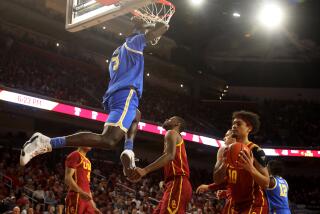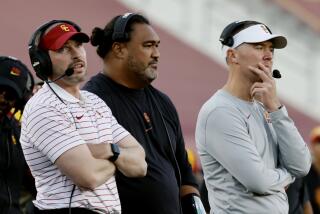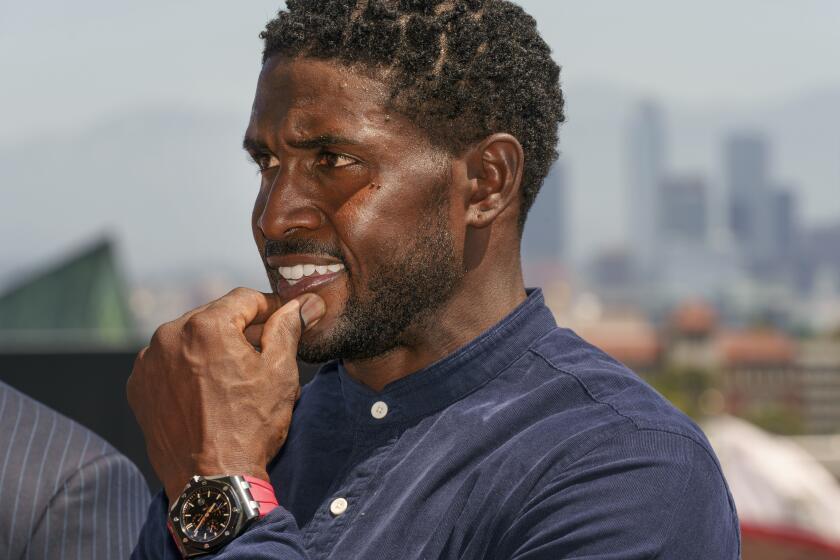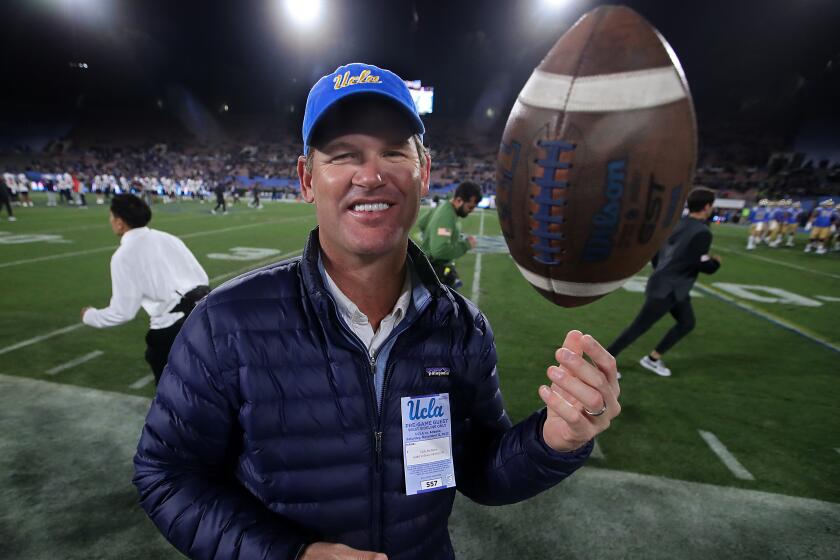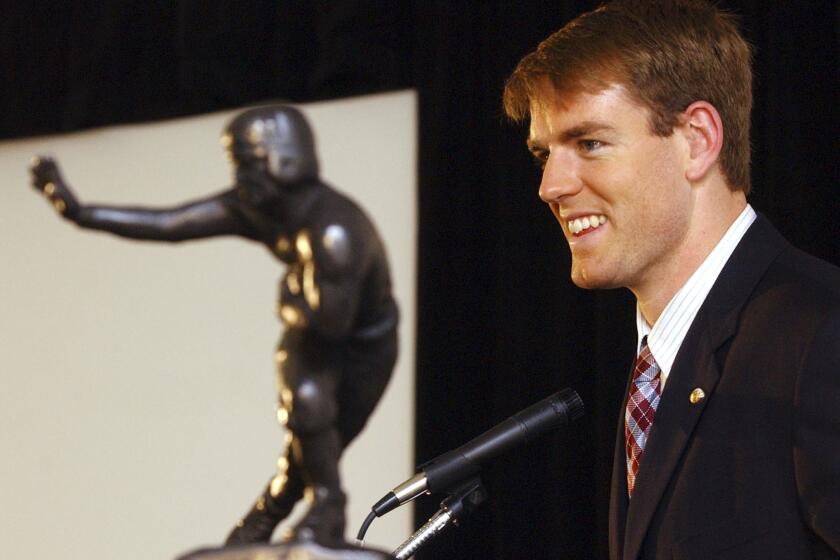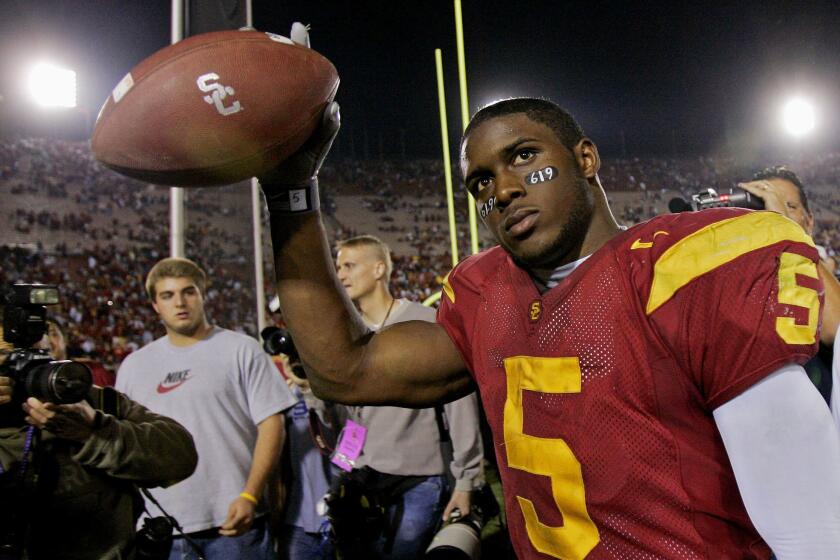USC’s Pat Haden on Steve Sarkisian: ‘He understands he let us all down’
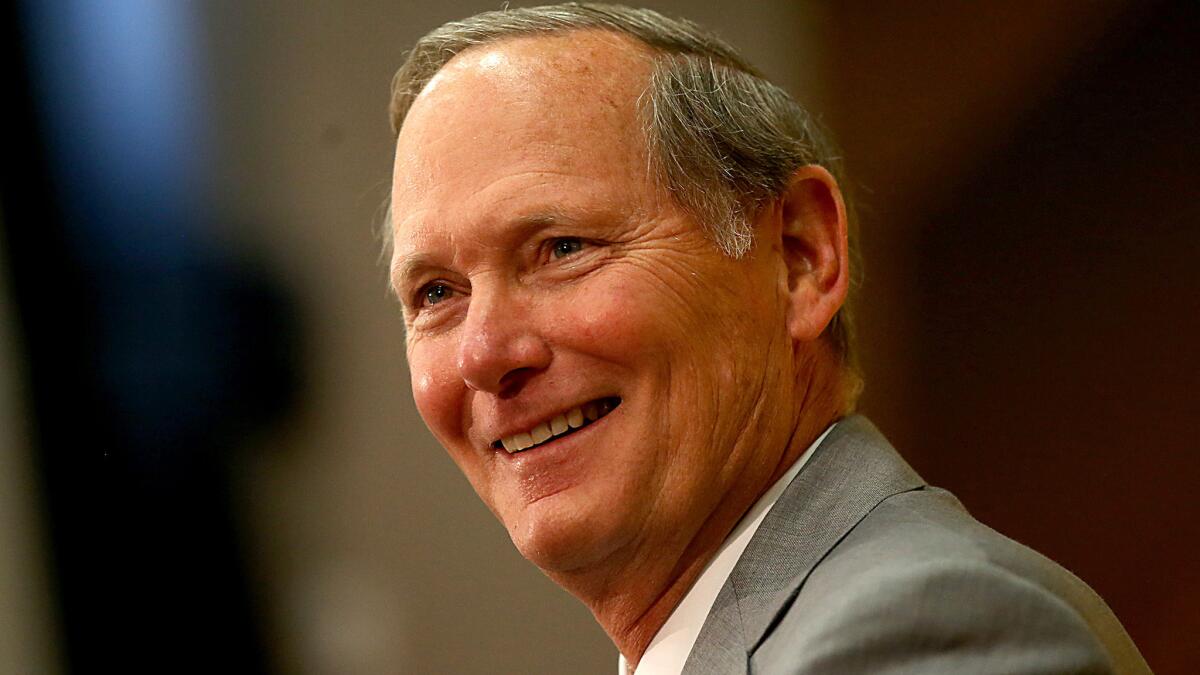
Pat Haden, a former Trojans quarterback who played on two national championship teams, has been athletic director at USC since Aug. 3, 2010.
Pat Haden started work as USC’s athletic director in August 2010, after the NCAA hit the athletic program with some of the most severe sanctions in college sports history. During his tenure, the former Trojans quarterback has helped raise millions of dollars, overseen construction or renovation of several major capital projects, emphasized a more balanced student-athlete experience and started two women’s sports programs.
He also served on the College Football Playoff selection committee, fired coaches, made two major hires and, occasionally, has been criticized for his actions and those of his coaches. Last month, football Coach Steve Sarkisian’s embarrassing behavior at USC’s annual “Salute to Troy” again put a spotlight on Haden, who publicly scolded the coach and encouraged him to seek treatment. Sarkisian, who insulted a couple of USC’s opponents and added an expletive before shouting the school’s “Fight On!” rallying cry, apologized and attributed his actions to his mixing alcohol with unspecified medication. If the coach was punished by the university, it was not announced.
Haden spoke late last week with Los Angeles Times reporter Gary Klein about his accomplishments, regrets, his hires, the future and Sarkisian.
What do you regard as your most proud accomplishments here?
I think the academic performance is considerably up, and I would like for our athletic department to be as good as the rest of the university in that regard. We had our best academic semester in 127 years, and it’s a lot more difficult school to perform academically than when I went here in the ‘70s. So the fact that our students are at a 3.0 [grade-point average] and the general student population I think 3.4 is the average, is pretty significant. . . . And then the football and basketball teams having their all-time highest GPA is significant, graduation rate’s up, community service hours are incredible in our local community. We’ve had an astounding fund-raising for five years here, being able to put these three facilities together and now the four facilities with the sand volleyball and now tennis. . . . You and others get myopic about football but I’m the athletic director, we have 21 programs. We won 10 national championships [in the last five years]. . . . Only Florida had more. And so I think really competitive in just about every sport, except basketball; men’s basketball has been a disappointment thus far. But I would say in just about every other sport we’ve been competitive, even baseball has kind of turned it around the last two years.
What would be your regrets?
You know, sometimes you hire too early, fire too late. Sometimes, I probably could have made some earlier decision on those things. . . . Other regrets? The way I handled the Stanford situation last year [Haden was summoned to the field by Sarkisian and then argued with officials. He was fined $25,000 by the Pac-12]. . . . I could have handled that better. That was certainly something in retrospect I should have handled differently.
In regard to Steve Sarkisian . . .
The Salute to Troy was a bad evening; it was embarrassing. He was terribly embarrassed; he’s apologized, he understands he let us all down. It isn’t the Steve Sarkisian I’ve known for a long time or certainly the guy I hired. As I’ve said at least three times, we had a very forthright discussion meeting on Sunday afternoon [the day after the incident]. Before that meeting, I talked to a number of my confidants, medical professionals, and as I’ve told you and others, went through a very confidential plan. Confidential means confidential. I’m not going to talk about it. . . . The counseling he’s gone through, from what I’ve heard — I don’t talk to counselors — but what he’s told me [is] he feels like it’s gone well for him. And I think that’s kind of where we are. . . . You know, when we made the change with [former coach] Lane [Kiffin], we did have a lot of time to investigate the coach both on football things and other things, and I think we have. . . . We have a process here of our due diligence, some of it’s sports specific, some of it’s non-sports specific. It includes, in his particular case, talking to a lot of people, a lot of people who know him well. It means having the university [do], which it does for every employee, a background check, an NCAA check, which again we do with all of our coaches. And I took note of the fact there wasn’t ever any discipline applied to him by the University of Washington while he was there.
Is it accurate to say that you vetted his drinking, to be quite specific? Was that area of his life vetted?
Again, I talked to a lot of people who have known him for a long time, [who] are very close friends of his. . . . If you look at the University of Washington, he was never, ever penalized or whatever for any incident up there.
When you talk about your advisors, people you trust in the process, can you tell me who those people are, and is (USC President) Max (Nikias) part of that?
In real significant decisions, if I were ever going to terminate a coach, I always check with the president because I directly report to him. But in this case, Max and I have known each other for almost two decades. I think he’s given me kind of a long runway to make decisions which we think are best for the athletic department. . . . You and I both know lots of people disagree with them, and other people agree with them. I get a little of both. Or a lot of both. Understood that when I took the job. I’ve been booed by hundreds of thousands of people when I played, so I felt like I was kind of ready for that piece of this. While I appreciate the passion that people have for USC athletics and particularly USC football, sometimes you’ve got to make some calls, and people are just going to agree or disagree. That’s going to happen here, whatever decision’s next, it’s going to be the same.
Did you consider suspending Steve?
We had a private conversation; I’m not going to talk anymore about that.
That night, when you saw what was happening, what was your reaction? When did you first become aware that something might be wrong?
I was very surprised. I saw Steve probably 45 minutes, or talked to Steve 45 minutes before he was on. I had to do my thing. I always go up and open the night. He usually introduces the coaches and players and such, so 45 minutes before there wasn’t an issue at all as far as I could tell.
Did you notice when he was on stage, did that come to your attention?
He was off. He was off.
How did that end? Did you summon him off the stage?
He had times where he goes on and off the stage. And I just said, ‘Steve I think it’s probably not the right time for you to go back up.’
You are off in the wings?
I was offstage.
Why weren’t you at that press conference (on the field before practice three days later)? When he came out and spoke with the media on Tuesday, typically it seems like you would be . . .
I’m never at press conferences. I never, I’m the worst practice-watcher AD in the history of ADs.
But you were there when there was the coaching change . . .
Well, that was a different thing. That was actually a press conference. Sark does those things I think every week, or every day, every day I guess he does those things. I never come out; I rarely come out to practice. . . .
You, according to USA Today, are the highest-paid athletic director in college sports. (Haden earned $2.5 million in total compensation in 2013, the latest year for which figures are available.) President Max Nikias, in 2013, said you took a pay cut to take this job. Is that true?
No comment.
How many charitable and corporate boards do you serve on?
I am on two foundation boards and one other board.
And in terms of financial services . . .
All approved by the president.
How much time do those responsibilities require?
Very little. They’re all here local. The foundations actually, I have to recuse myself sometimes, but they’ve given millions of dollars, tens of millions of dollars to USC, so that’s a benefit here. So it takes very little time.
But the corporate boards, the funds, that does not take much time?
Very little time.
If you are on multiple boards, that does not impact your performance?
The boards I’m on are right here in Los Angeles. One’s in Pasadena, where I live.
I think Bloomberg lists you on 28 different funds, different things . . .
It’s one board, though.
Do you have to do quarterly meetings?
Quarterly meetings right here in Los Angeles.
So in terms of people who might say, “Pat is not able to spend as much time as he needs to . . .”
The president, when he asked to hire me, I was on these foundation boards and it was cleared.
How did that process work? Did you go to Max Nikias and say, ‘I’m stepping up; I want this job.’ Or did he come to you?
He approached me. Probably two months before I actually accepted the job, we met a couple times. We discussed it. Kind of told him some of the things I was doing. If I were going to do it, I asked that we break ground on the John McKay Center. I think that was really important to do that. And then just some transitional things that I’d have to do to do it. And then kind of what his expectations were and how you define success. [With the NCAA sanctions in place it was,] how we were going to define success during that time frame, when we couldn’t go to bowls and [had] scholarship limitations and none of us knew how bad it was going to get at that point. I certainly didn’t, and I think even the NCAA didn’t, quite honestly. So it was a process of a couple months. And, as you probably heard me say before, my wife really kind of, didn’t convince me, [but] she encouraged me to take the job, thought it was a good time in my life to kind of change directions and try something a little different. In my old job, I did a lot of investment work but it never really was an operational job, it was more board stuff. So it was an interesting new challenge for me at an institution I love.
How’s your health?
My health is good.
You had an issue about a year ago . . .
I’m managing my health.
So it’s OK?
It’s OK.
How much longer will you be the athletic director?
I don’t know.
You addressed it once in your newsletter because you had heard rumors, but how long will you be the athletic director?
I don’t know. I don’t have a contract. I’m an employee at will. The president can fire me any time he wants and I can retire any time I want. I love the university. I feel a great obligation to this university. I’d really like to get basketball fixed. I’d like to see that happen before I go. I think we’re trending in the right direction. We have a huge Coliseum project coming up. There’s some of that, I think that quite honestly only I can do, and so that adds some complexity to the answer to the question. . . . I really do love the place. I’m not a kind of a hired-gun athletic director here because I went to school here, I played athletics here, it means so much to me, the university means so much to me, that’s why an evening like [the recent “Salute to Troy” is] tough on me, because I care about the university so much and I want the reputation of our athletic department to meet the reputation of the rest of the university. Because the rest of the university is going at this incredible trajectory. I mean, I kind of feel like a hamster in a cage, trying to kind of keep us going on that same trajectory. . . . It is a time-consuming pressure job with a great deal of stress, because no matter how well things are going you never know what’s around the corner. There’s never entire satisfaction. We could go, ‘We went undefeated in sand volleyball.’ I’m sure there are people complaining about our sand volleyball team. [Laughing.] You just can’t please ‘em all. So, it kind of wears on you some.
That being said, are you going to see this through despite that?
I will be here this year for sure. I have not said more than that. I will not leave the president in a lurch, ever. I will give him plenty of advice when I’m planning on stepping down. I hope he gives me enough notice when he’s going to fire me, because it works both ways. Again, a lot of athletic directors have contracts. I don’t have one, so it’s a little different. Max Nikias has been terrific to work with. As I’ve said, I’ve known him for a couple decades and I want to do what’s right for him and for USC and our athletic department, and there’s a few things I’ve got to button up. And then, on the other hand, hey, I could be here 10 years. I just don’t know.
With Steve moving forward, how do you evaluate his performance so far and what’s the outlook for the future?
I thought we had a good year last year. Obviously, [there were] two games we certainly could have won, if not should have won. Could have lost the Arizona game, too, as well, so that’s still a net difference of one. . . . Beat one of our natural rivals in Notre Dame. Won a bowl game. So, considering, and I know you guys are all tired of hearing about the numbers, but the facts are the facts and we were down a considerable number of players versus our competition. I thought it was a good year. This is another season, another new set of challenges. The [Pac-12] conference, particularly the South, is difficult. Tough road games. But we’re a tough out, I think. Particularly if our young guys continue to develop. They’re going to play a lot and have to play a lot and should play a lot because they’re good players. And you have an experienced quarterback. I think it’s probably good that Steve kind of handed off the play calling to [assistant coach] Clay [Helton]. It lets him do a lot of other things, I think, which he is actually quite good at those things. And I think the players actually rally around him. I think they like him. He recruited a lot of these kids when he was at Washington, so he had relationships with them and their families as well, so there wasn’t as big of an adjustment for him as it would have been perhaps for another coach. I don’t think you judge a coach week to week. I mean, I think you have to give these coaches — and it’s not just Steve, it’s really kind of my way of doing business. When I was hiring CEOs in my old business, you have to give them some runway to be successful or prove to you that they’re not going to get it done. So, and I think I’ve given, as I’ve shown, I’ve given a lot of coaches here — and again, not just the football coaches that you’re thinking about — a lot of our coaches a lot of runway to prove that they’re the right person to run that program. I’ve terminated coaches, one for intentionally breaking NCAA rules, another one [for] verbally abusing athletes, another one for performance. So every day you’re kind of evaluating these coaches. We do personal end-of-the-year evaluations with them. The good, the bad, the uglies. I’m in on every single one of our head coaches’ evaluations. I don’t directly oversee every sport, but I do it for football and basketball and women’s tennis, those three that I directly oversee. But I think, it’s too early to tell.
What about (basketball Coach) Andy Enfield?
Let’s be perfectly honest, the last two years have been dismal. But to be fair to Andy, he didn’t really — I hate to talk badly about our past players — but we didn’t have really Pac-12-caliber players. OK, we didn’t have Pac-12-caliber players. I think we have Pac-12-caliber players now, for the most part. We’ve had two good recruiting years, at least by USC standards for basketball, two top-25, I think, years. I think the talent level’s up; the experience level’s up. We can’t use that as an excuse. I think Arizona, UCLA, Cal probably have better personnel at this point, but after that I think we’re in the mix with the rest of the conference. I think we’re in the right trajectory, I really do. I think we have a chance to be a good team next year, and quite good the following year.
So in terms of grading your major hires, you’ve got 21 sports here, but in terms of football and basketball what would you give yourself?
It’s way too early to grade.
Twitter: @latimesklein
More to Read
Go beyond the scoreboard
Get the latest on L.A.'s teams in the daily Sports Report newsletter.
You may occasionally receive promotional content from the Los Angeles Times.


